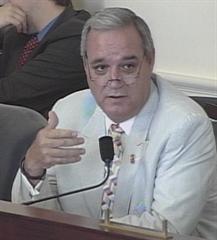
House Passes S.1, the Keystone XL Pipeline Approval Act
More than six years after the application to construct the Keystone XL pipeline was submitted to the Obama Administration, the project remains delayed in a bureaucratic nightmare. Keystone XL would create more than 40,000 jobs, help lower energy costs for consumers, increase energy security, and, according to the State Department’s own analysis, have minimal environmental impact.
The House has acted multiple times to approve Keystone XL, including earlier this year, and, after considering amendments, the Senate sent S.1, their version of the Keystone XL Pipeline Approval Act, to the House, which we voted on last week. I voted in favor of S.1, which passed the House by a vote of 270-152. This bill will now be sent to the President, where he will have to decide whether to sign it and approve this commonsense project, or follow through on his veto threat. The American people overwhelmingly support Keystone XL. It is time for the President to do the right thing and sign this bill.
House Passes H.R. 636, the America’s Small Business Tax Relief Act of 2015
The House passed H.R. 636, the America’s Small Business tax Relief Act of 2015, which comprises three separate measures to permanently extend certain temporary tax provisions that provide critical tax relief to our Nation's small businesses. Specifically, this bill would make permanent a provision that allows businesses to expense up to $500,000 in equipment, property, and computer software used in a trade or business; would permanently extend the five-year period for which an S corporation must hold its assets following conversion from a C corporation to avoid the tax on built-in gains; and would make permanent a provision that allows S corporation shareholders to reduce the basis of their shares by the adjusted basis of charitable contributions. As a result of this measure, small businesses would be provided the certainty to invest and build their businesses and create jobs.
House Passes H.R. 644, the America Gives More Act of 2015
Americans are some the most charitable in the world, both in domestic charities assistance and donations to charities abroad. Incentivizing this charitable nature would only unleash additional giving, reducing dependence on government programs and fostering communities through private donations nationwide. Last week, the House passed H.R.644, the America Gives More Act of 2015, which would make permanent an extension and expansion of charitable tax deduction for contributions of food inventory by businesses, establish certain tax-free distributions from Individual Retirement Accounts for charitable purposes, and would make permanent tax deductions for contributions of conservation easements and a flat one-percent excise tax on investment income of private foundations. Making these provisions permanent avoids annually legislating charitable donations through a piecemeal approach, providing greater certainty to charitable tax policy.
Congress Passes H.R.431, Awarding the Congress' Highest Honor to the Foot Soldiers who participated in Bloody Sunday, Turnaround Tuesday, or the final Selma to Montgomery Voting Rights March in March of 1965, which served as a catalyst for the Voting Rights Act of 1965
Next month, our Nation will mark the 50th anniversary of one of the seminal moments in the Civil Rights Movement: the Selma to Montgomery marches. Last week, the House unanimously passed legislation to award a Congressional Gold Medal to the thousands of individuals who participated in these marches. On March 7, 1965, a group of more than 500 individuals, led by then-Chairman of the Student Nonviolent Coordinating Committee and current Member of Congress, John Lewis, and Reverend Hosea Williams of the Southern Christian Leadership Conference, set out to make the 54-mile march from Selma, Alabama to the Alabama State Capitol Building in Montgomery to draw attention to the widespread disenfranchisement of African-American voters in Dallas County, where Selma is located. As they attempted to leave the city of Selma, the marchers were viciously attacked and the march was turned back. Two days after this event, known as “Bloody Sunday,” Dr. Martin Luther King, Jr. led a second march, known as “Turnaround Tuesday,” which was also stopped as the marchers attempted to leave the city of Selma. Despite these attempts at intimidation, a third march from Selma to Montgomery began on March 21 and was completed on March 25, when the marchers arrived at the State Capitol in Montgomery, by which time their numbers had increased to an estimated 25,000 individuals.
There are many moments which have changed the course of our Nation’s history, and the Selma to Montgomery marches certainly belong in this category. In an address to a joint session of Congress, which was televised for the Nation, President Johnson cited the Selma to Montgomery marches as one of the key catalysts for the introduction and eventual passage of the Voting Rights Act of 1965. Although the Voting Rights Act came about after a moment of strife and discord, it is emblematic of what can be achieved when Americans of all stripes come together to stand up for our inalienable constitutional rights. As we celebrate Black History Month during the month of February, it is fitting for the House to pass legislation granting the Congressional Gold Medal to the participants of these marches in recognition of their brave actions, which helped change the course of our Nation’s history.
This article originally appeared on Santa Rosa Press Gazette: Washington Update
